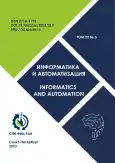Information Security Risk Analysis in Food Processing Industry Using a Fuzzy Inference System
- Authors: Asfha A.E1, Vaish A.2
-
Affiliations:
- ITMO University
- Indian Institute of Information Technology, Allahabad
- Issue: Vol 22, No 5 (2023)
- Pages: 1083-1102
- Section: Information security
- URL: https://journal-vniispk.ru/2713-3192/article/view/265830
- DOI: https://doi.org/10.15622/ia.22.5.5
- ID: 265830
Cite item
Full Text
Abstract
Recently, different attempts have been made to characterize information security threats, particularly in the industrial sector. Yet, there have been a number of mysterious threats that could jeopardize the safety of food processing industry data, information, and resources. This research paper aims to increase the efficiency of information security risk analysis in food processing industrial information systems, and the participants in this study were experts in executive management, regular staff, technical and asset operators, third-party consultancy companies, and risk management professionals from the food processing sector in Sub-Saharan Africa. A questionnaire and interview with a variety of questions using qualitative and quantitative risk analysis approaches were used to gather the risk identifications, and the fuzzy inference system method was also applied to analyze the risk factor in this paper. The findings revealed that among information security concerns, electronic data in a data theft threat has a high-risk outcome of 75.67%, and human resource management (HRM) in a social engineering threat has a low-risk impact of 26.67%. Thus, the high-probability risk factors need quick action, and the risk components with a high probability call for rapid corrective action. Finally, the root causes of such threats should be identified and controlled before experiencing detrimental effects. It's also important to note that primary interests and worldwide policies must be taken into consideration while examining information security in food processing industrial information systems.
About the authors
A. E Asfha
ITMO University
Author for correspondence.
Email: baquesti2003@gmail.com
Kronverksky Av. 49
A. Vaish
Indian Institute of Information Technology, Allahabad
Email: abhishek@iiita.ac.in
Uttar Pradesh -
References
- Food processing in Sub-Saharan Africa: Solutions for African Food Enterprises. TechnoServes, 2017. 44 p. Available at: https://www.technoserve.org/wp-content/uploads/2018/04/solutions-for-african-food-enterprises-final-report.pdf. (accessed 26.07.2023).
- Whitman M.E., Mattord H.J. Principles of Information Security. Cengage Learning. 2018. 750 p.
- Kriaa S., Bouissou M., Laarouchi Y. A Model Based Approach for SCADA Safety and Security Joint Modelling: S-Cube. 10th IET System Safety and Cyber-Security Conference. 2015. doi: 10.1049/cp.2015.0293.
- Shin J., You I., Seo J.T. Investment priority analysis of ICS information security resources in smart mobile IoT network environment using the analytic hierarchy process. Mobile Information Systems. 2020. vol. 2020. doi: 10.1155/2020/8878088.
- Shamala P., Ahmad R., Zolait A.H., Bin Sahib S. Collective information structure model for information security risk assessment (ISRA). Journal of Systems and Information Technology. 2015. vol. 17. no. 2. pp. 193–219. doi: 10.1108/JSIT-02-2015-0013.
- Abbass W., Baina A., Bellafkih M. Improvement of information system security risk management. 4th IEEE International Colloquium on Information Science and Technology (CiSt). 2016. pp. 182–187. doi: 10.1109/CIST.2016.7805039.
- Yang M. Information Security Risk Management Model for Big Data. Advances in Multimedia. 2022. vol. 2022. doi: 10.1155/2022/3383251.
- Information Security Risk Assessment Using Situational Awareness Frameworks and Application Tools. Risks. 2022.
- Ebrat M., Ghodsi R. Construction project risk assessment by using adaptive-network-based fuzzy inference system: An empirical study. KSCE Journal of Civil Engineering. 2014. vol. 18. pp. 1213–1227. doi: 10.1007/s12205-014-0139-5.
- Stebbins-Wheelock E.J., Turgeon A. Guide to Risk Assessment and Response. The University of Vermont, 2018. 17 p.
- Sobel P.J., Prawitt D.F., Dohrer R.D., Murdock D.C., Thomson J.C., Miller P.K. Compliance risk management: applying the COSO ERM framework. Committee of Sponsoring Organizations of the Treadway Commission (COSO). 2020. 48 p.
- Chandra N.A., Ramli K., Ratna A.A.P., Gunawan T.S. Information Security Risk Assessment Using Situational Awareness Frameworks and Application Tools. Risks. 2022. vol. 10(8). no. 165. doi: 10.3390/risks10080165.
- Crotty J., Daniel E. Cyber threat: its origins and consequence and the use of qualitative and quantitative methods in cyber risk assessment. Applied Computing and Informatics. 2022. doi: 10.1108/ACI-07-2022-0178.
- Carlsson E., Mattsson M. The MaRiQ model: A quantitative approach to risk management in cybersecurity. 2019. Uppsala: Uppsala Universitet, 2019. 97 p.
- Fadyeyeva I., Gryniuk O. Fuzzy modelling in risk assessment of oil and gas production enterprises’ activity. Baltic Journal of Economic Studies. 2017. vol. 3. no. 4. pp. 256–264.
- Papageorgiou E.I., Aggelopoulou K., Gemtos T.A., Nanos G.D. Development and Evaluation of a Fuzzy Inference System and a Neuro-Fuzzy Inference System for Grading Apple Quality. Applied Artificial Intelligence. 2018. vol. 32. no. 3. pp. 253–280. doi: 10.1080/08839514.2018.1448072.
- Blasi A.H. The use of Fuzzy Logic Control in Manufacturing Systems. 2020. 12 p.
- Kotenko I., Saenko I., Ageev S. Countermeasure Security Risks Management in the Internet of Things Based on Fuzzy Logic Inference. IEEE TrustCom/BigDataSE/ISPA. 2015. pp. 654-659. doi: 10.1109/Trustcom.2015.431.
- Hadacek L., Sivakova L., Sousek R., Zeegers M. Assessment of security risks in railway transport using the fuzzy logical deduction method. Communications – Scientific Letters of the University of Zilina. 2020. vol. 22. no. 2. pp. 79–87. doi: 10.26552/com.C.2020.2.79-87.
- Kaka S., Hussin H., Khan R., Akbar A., Sarwar U., Ansari J. Fuzzy logic-based quantitative risk assessment model for hse in oil and gas industry. Universiti Teknologi PETRONAS, 2022. doi: 10.17605/OSF.IO/WVG2H.
- Zhao Y., Talha M. Evaluation of food safety problems based on the fuzzy comprehensive analysis method. Food Science and Technology. 2021. vol. 42. no. e47321. doi: 10.1590/FST.47321.
Supplementary files









